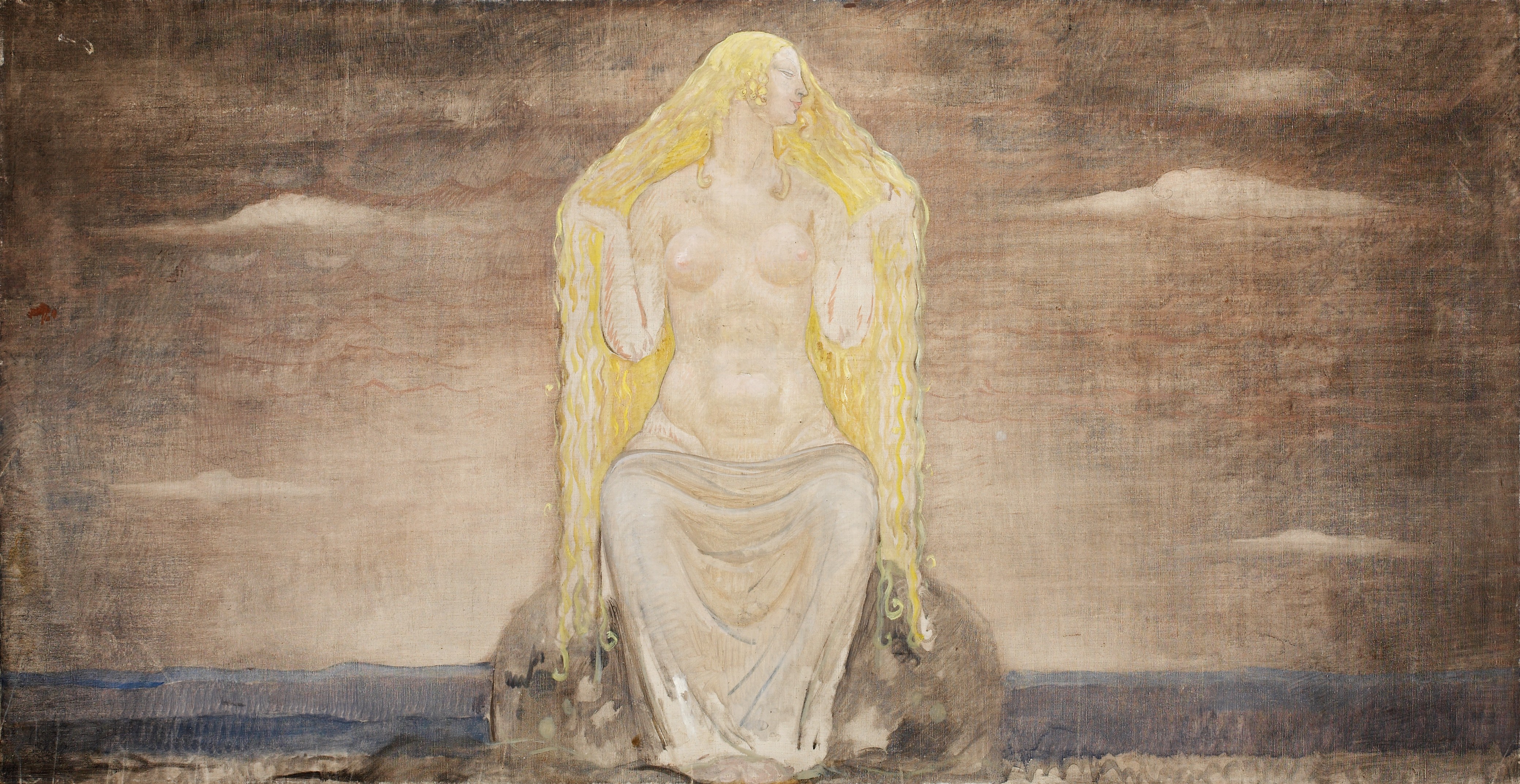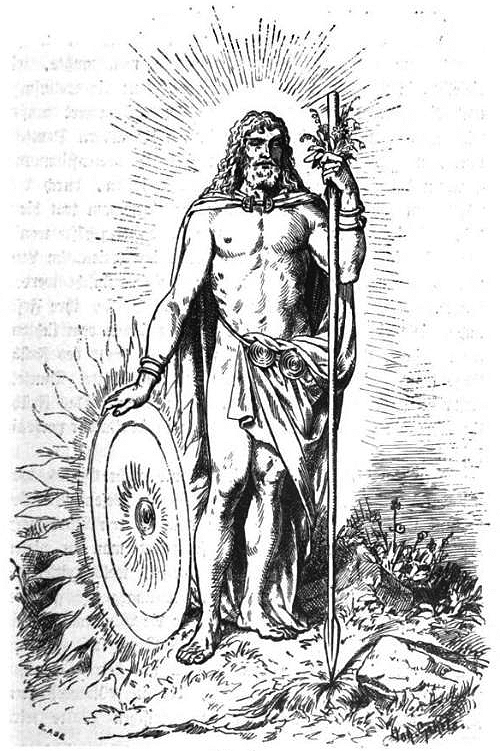|
Kvasir
In Norse mythology, Kvasir (Old Norse: ) was a being born of the saliva of the Æsir and the Vanir, two groups of gods. Extremely wise, Kvasir traveled far and wide, teaching and spreading knowledge. This continued until the dwarfs Fjalar and Galar killed Kvasir and drained him of his blood. The two mixed his blood with honey, thus creating the Mead of Poetry, a mead which imbued the drinker with skaldship and wisdom, and the spread of which eventually resulted in the introduction of poetry to mankind. Kvasir is attested in the ''Prose Edda'' and ''Heimskringla'', both written by Snorri Sturluson in the 13th century, and in the poetry of skalds. According to the ''Prose Edda'', Kvasir was instrumental in the capture and binding of Loki, and an euhemerized account of the god appears in ''Heimskringla'', where he is attested as the wisest among the Vanir. Scholars have connected Kvasir to methods of beverage production and peacemaking practices among ancient peoples. Attestations ... [...More Info...] [...Related Items...] OR: [Wikipedia] [Google] [Baidu] |
Vanir
In Norse mythology, the Vanir (; Old Norse: , singular Vanr ) are a group of gods associated with fertility, wisdom, and the ability to see the future. The Vanir are one of two groups of gods (the other being the Æsir) and are the namesake of the location Vanaheimr (Old Norse "Home of the Vanir"). After the Æsir–Vanir War, the Vanir became a subgroup of the Æsir. Subsequently, members of the Vanir are sometimes also referred to as members of the Æsir. The Vanir are attested in the ''Poetic Edda'', compiled in the 13th century from earlier traditional sources; the ''Prose Edda'' and ''Heimskringla'', both written in the 13th century by Snorri Sturluson; and in the poetry of skalds. The Vanir are only attested in these Old Norse sources. All sources describe the god Njörðr, and his children Freyr and Freyja as members of the Vanir. A euhemerism, euhemerized prose account in ''Heimskringla'' adds that Sister-wife of Njörðr, Njörðr's sister—whose name is not provided—a ... [...More Info...] [...Related Items...] OR: [Wikipedia] [Google] [Baidu] |
Æsir–Vanir War
In Norse mythology, the Æsir–Vanir War was a conflict between two groups of deities that ultimately resulted in the unification of the Æsir and the Vanir into a single pantheon. The war is an important event in Norse mythology, and the implications for the potential historicity surrounding accounts of the war are a matter of scholarly debate and discourse. Fragmented information about the war appears in surviving sources, including ''Völuspá'', a poem collected in the ''Poetic Edda'' in the 13th century from earlier traditional sources; in the book ''Skáldskaparmál'' in the ''Prose Edda'', written or compiled in the 13th century by Snorri Sturluson; and in euhemerized form in the ''Ynglinga saga'' from ''Heimskringla'', also often considered to have been written by Snorri Sturluson in the 13th century. Attestations ''Poetic Edda'' In two stanzas of ''Völuspá'', the war is recounted by a völva (who refers to herself here in the third person) while the god Óðinn quest ... [...More Info...] [...Related Items...] OR: [Wikipedia] [Google] [Baidu] |
Mead Of Poetry
In Norse mythology, the Poetic Mead or Mead of Poetry, also known as Mead of Suttungr, is a mythical beverage that whoever "drinks becomes a skald or scholar" able to recite any information and solve any question. This myth was reported by Snorri Sturluson in Skáldskaparmál. The drink is a vivid metaphor for poetic inspiration, often associated with Odin the god of 'possession' via berserker rage or poetic inspiration. Plot Creation of the mead of poetry and murder of Kvasir After the Æsir-Vanir War, the gods sealed the truce they had just concluded by spitting in a vat. To keep a symbol of this truce, they created from their spittle a man named Kvasir. He was so wise that there were no questions he could not answer. He travelled around the world to give knowledge to mankind. One day, he visited the dwarfs Fjalar and Galar. They killed him and poured his blood into two vats and a pot called Boðn, Són and Óðrerir. They mixed his blood with honey, thus creating a mead whic ... [...More Info...] [...Related Items...] OR: [Wikipedia] [Google] [Baidu] |
Óðrerir
In Norse mythology, Óðrerir, Óðrørir or Óðrœrir refers either to one of the three vessels that contain the mead of poetry (along with Boðn and Són) or to the mead itself. Attestations Poetic Edda Óðrerir is mentioned in two ambiguous passages of the ''Hávamál''. In a first stanza (107), it is sometimes assumed that Óðrerir is synonymous with mead of poetry,Simek 1996. but both interpretations are possible. :Of a well-assumed form :I made good use: :few things fail the wise; :for Odhrærir :is now come up :to men’s earthly dwellings : ::—''Hávamál'' (107)Thorpe's translation In another stanza (140), the meaning of Óðrerir depends on the translation. In most translations, Óðrerir seems to refer to a vessel, but other interpretations of ''ausinn Óðreri'' are possible, which can lead to understand Óðrerir to be the mead itself. Prose Edda For Snorri Sturluson, Óðrerir is the name of the kettle in which Kvasir's blood was mixed with honey to create t ... [...More Info...] [...Related Items...] OR: [Wikipedia] [Google] [Baidu] |
Dwarf (mythology)
A dwarf () is a type of supernatural being in Germanic folklore, including mythology. Accounts of dwarfs vary significantly throughout history however they are commonly, but not exclusively, presented as living in mountains or stones and being skilled craftsmen. In early literary sources, only males are explicitly referred to as dwarfs, although they are described as having sisters and daughters, while both male and female dwarfs feature in later saga literature and folklore. Dwarfs are sometimes described as short, however, scholars have noted that this is neither explicit nor of relevance to their roles in the earliest sources. Dwarfs continue to feature in modern popular culture such as in the works of J.R.R. Tolkien and Terry Pratchett, where they are often, but not exclusively, presented as distinct from elves. Etymology The modern English noun ''dwarf'' descends from ang, dweorg. It has a variety of cognates in other Germanic languages, including non, dvergr and goh, tw ... [...More Info...] [...Related Items...] OR: [Wikipedia] [Google] [Baidu] |
Bragi
Bragi (; Old Norse: ) is the skaldic god of poetry in Norse mythology. Etymology The theonym Bragi probably stems from the masculine noun ''bragr'', which can be translated in Old Norse as 'poetry' (cf. Icelandic ''bragur'' 'poem, melody, wise') or as 'the first, noblest' (cf. poetic Old Norse ''bragnar'' 'chiefs, men', ''bragningr'' 'king'). It is unclear whether the theonym semantically derives from the first meaning or the second. A connection has been also suggested with the Old Norse ''bragarfull'', the cup drunk in solemn occasions with the taking of vows. The word is usually taken to semantically derive from the second meaning of ''bragr'' ('first one, noblest'). A relation with the Old English term ''brego'' ('lord, prince') remains uncertain. ''Bragi'' regularly appears as a personal name in Old Norse and Old Swedish sources, which according to linguist Jan de Vries might indicate the secondary character of the god's name. Attestations Snorri Sturluson writes i ... [...More Info...] [...Related Items...] OR: [Wikipedia] [Google] [Baidu] |
Mead
Mead () is an alcoholic beverage made by fermenting honey mixed with water, and sometimes with added ingredients such as fruits, spices, grains, or hops. The alcoholic content ranges from about 3.5% ABV to more than 20%. The defining characteristic of mead is that the majority of the beverage's fermentable sugar is derived from honey. It may be still, carbonated, or naturally sparkling; dry, semi-sweet, or sweet. The term honey wine is sometimes used as a synonym for mead, although ''wine'' is typically defined to be the product of fermented grapes or certain other fruits, and some cultures have honey wines that are distinct from mead. The honey wine of Hungary, for example, is the fermentation of honey-sweetened pomace of grapes or other fruits. Mead was produced in ancient times throughout Europe, Africa, and Asia, and has played an important role in the mythology of some peoples. In Norse mythology, for example, the Mead of Poetry, crafted from the blood of Kvasir (a wise ... [...More Info...] [...Related Items...] OR: [Wikipedia] [Google] [Baidu] |
Fjalar And Galar
In Nordic mythology, Fjalar ( non, Fjalarr ) and his brother Galar ( non, Galarr ), were wicked dwarfs who killed Kvasir and turned his blood into the mead of poetry, which inspired poets. They appear in ''Skáldskaparmál''. Myth Fjalar and Galar murdered a jötunn named Gilling, along with his wife. Their son, Suttungr, searched for his parents and threatened the dwarven brothers, who offered him the magical mead in exchange for sparing their lives. Suttungr took it and hid it in the center of a mountain, with his daughter, Gunnlöð, standing guard. Odin eventually decided to obtain the mead. He worked for Baugi, Suttungr's brother, for an entire summer, then asked for a small sip of the mead. Baugi drilled into the mountain, whereupon Odin changed into a snake and slithered inside. Inside, Gunnlöð was guarding the mead, but he seduced her and persuaded her to give him three sips; Odin proceeded to drink all the mead, change into an eagle and escape. Sources *Snorri Stur ... [...More Info...] [...Related Items...] OR: [Wikipedia] [Google] [Baidu] |
Baldr
Baldr (also Balder, Baldur) is a god in Germanic mythology. In Norse mythology, Baldr (Old Norse: ) is a son of the god Odin and the goddess Frigg, and has numerous brothers, such as Thor and Váli. In wider Germanic mythology, the god was known in Old English as , and in Old High German as , all ultimately stemming from the Proto-Germanic theonym ('hero' or 'prince'). During the 12th century, Danish accounts by Saxo Grammaticus and other Danish Latin chroniclers recorded a euhemerized account of his story. Compiled in Iceland during the 13th century, but based on older Old Norse poetry, the ''Poetic Edda'' and the ''Prose Edda'' contain numerous references to the death of Baldr as both a great tragedy to the Æsir and a harbinger of Ragnarök. According to ''Gylfaginning'', a book of Snorri Sturluson's Prose Edda, Baldr's wife is Nanna and their son is Forseti. Baldr had the greatest ship ever built, Hringhorni, and there is no place more beautiful than his hall, Breidablik ... [...More Info...] [...Related Items...] OR: [Wikipedia] [Google] [Baidu] |
Ægir
Ægir (anglicised as Aegir; Old Norse 'sea'), Hlér (Old Norse 'sea'), or Gymir (Old Norse less clearly 'sea, engulfer'), is a jötunn and a personification of the sea in Norse mythology. In the Old Norse record, Ægir hosts the gods in his halls and is associated with brewing ale. Ægir is attested as married to a goddess, Rán, who also personifies the sea, and together the two produced daughters who personify waves, the Nine Daughters of Ægir and Rán, and Ægir's son is Snær, personified snow. Ægir may also be the father of the beautiful jötunn Gerðr, wife of the god Freyr, or these may be two separate figures who share the same name (see below and Gymir (father of Gerðr)). One of Ægir's names, ''Hlér'', is the namesake of the island Læsø (Old Norse ''Hléysey'' 'Hlér's island') and perhaps also Lejre in Denmark. Scholars have long analyzed Ægir's role in the Old Norse corpus, and the concept of the figure has had some influence in modern popular culture. Names ... [...More Info...] [...Related Items...] OR: [Wikipedia] [Google] [Baidu] |



-ed-Nibelungen_Not-p091-sigfird&alberich-gezwerge.jpg)


